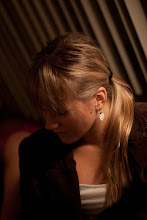Today we read a poem called "Upon the Burning of Our House, July 10, 1666" by Anne Bradstreet. In the beginning of the poem she talks about how she awoke to find her house burning, and immediately prayed to God to give her the strength to deal with it. As she watches her house burn to the ground, she thanks God that He gives and takes away; something incredibly admirable after losing everything she owned. Then grief sets in. She begins to speak of all the things that she lost, describing each one in detail and mourning over her loss. What's awesome is that in the middle of it, her prayer is answered! God gently reminds her of the place that He has prepared for her in heaven, and it's great reward. I had to do an essay on this, and I soaked it up. The more I wrote, the greater I understood. It was cool to share my insight with the class, too.
Here's my favorite part of it, at the end, where she begins to mediate on God's goodness:
Then straight I gin my heart to chide,
And didst thy wealth on earth abide?
Didst fix thy hope on mouldering dust,
The arm of flesh didst make thy trust?
Raise up thy thoughts above the sky
That dunghill mists away may fly.
Thou hast an house on high erect
Fram'd by that mighty Architect,
With glory richly furnished,
Stands permanent tho' this bee fled.
It's purchased, and paid for too
By him who hath enough to do.
A Prise so vast as is unknown,
Yet, by his Gift, is made thine own.
Ther's wealth enough, I need no more;
Farewell my Pelf, farewell my Store.
The world no longer let me Love,
My hope and Treasure lies Above.

1 comment:
I really like that poem!
That is awesome that you are gaining such an understanding from such unorthodox places, hahah. I really admire your ability to find the greatness and the meaning in places many others - myself included - would ignore.
Post a Comment